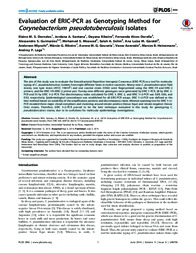Evaluation of ERIC-PCR as Genotyping Method for Corynebacterium pseudotuberculosis Isolates.
Evaluation of ERIC-PCR as Genotyping Method for Corynebacterium pseudotuberculosis Isolates.
Author(s): DORNELES, E. M. S.; SANTANA, J. A.; RIBEIRO, D.; DORELLA, F. A.; GUIMARAES, A. S.; MOAWAD, M. S.; SELIM, S. A.; GARALDI, A. L. M.; MIYOSHI, A.; RIBEIRO, M. G.; GOUVEIA, A. M. G.; AZEVEDO, V.; HEINEMANN, M. B.; LAGE, A. P.
Summary: The aim of this study was to evaluate the Enterobacterial Repetitive Intergenic Consensus (ERIC-PCR) as a tool for molecular typing of C. pseudotuberculosis isolates from eight different hosts in twelve countries. Ninety-nine C. pseudotuberculosis field strains, one type strain (ATCC 19410T ) and one vaccine strain (1002) were fingerprinted using the ERIC-1R and ERIC-2 primers, and the ERIC-1R+ERIC-2 primer pair. Twenty-nine different genotypes were generated by ERIC 1-PCR, 28 by ERIC 2-PCR and 35 by ERIC 1+2-PCR. The discriminatory index calculated for ERIC 1, ERIC 2, and ERIC 1+2-PCR was 0.89, 0.86, and 0.92, respectively. Epidemiological concordance was established for all ERIC-PCR assays. ERIC 1+2-PCR was defined as the best method based on suitability of the amplification patterns and discriminatory index. Minimal spanning tree for ERIC 1+2-PCR revealed three major clonal complexes and clustering around nitrate-positive (biovar Equi) and nitrate-negative (biovar Ovis) strains. Therefore, ERIC 1+2-PCR proved to be the best technique evaluated in this study for genotyping C. pseudotuberculosis strains, due to its usefulness for molecular epidemiology investigations.
Publication year: 2014
Types of publication: Journal article
Unit: Embrapa Dairy Cattle
Observation
Some of Embrapa's publications are published as ePub files. To read them, use or download one of the following free software options to your computer or mobile device. Android: Google Play Books; IOS: iBooks; Windows and Linux: Calibre.
Access other publications
Access the Agricultural Research Database (BDPA) to consult Embrapa's full library collection and records.
Visit Embrapa Bookstore to purchase books and other publications sold by Embrapa.

